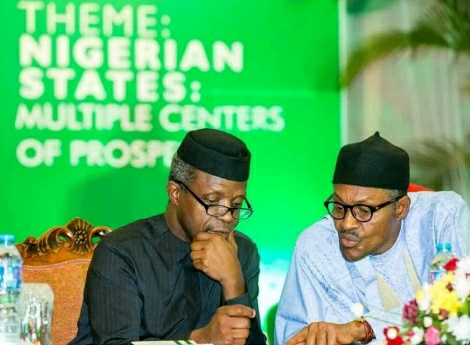There finally seems to be some movement in the country. A new life has been infused into the country. There is now legitimate reason to be hopeful.
Why has it taken the ascendancy of Osinbajo to the acting presidency to achieve this? The answer is simple: symbolic presence.

President Muhammadu Buhari lacked symbolic presence in the 20 months he was in charge. His presence was barely felt in the country. Nor was his voice heard. It took him six months to appoint ministers.
Attahiru Jega notified him of the impending expiration of his tenure months in advance, but the president didn’t act, and caused a needless bureaucratic kerfuffle at INEC.
A minister died in a car crash several months ago, and he hasn’t been replaced up to now. Another minister resigned to take up an international job. She hasn’t been replaced up to now. The Supreme Court had an acting Chief Justice for months.
It took Osinbajo’s acting presidency to forward his name to the Senate for confirmation. Boards of several government agencies haven’t been constituted up to now, meaning government agencies, which are the engine rooms of government, can’t take decisions since they can’t constitutionally bypass their boards in their decision making.
I can go on, but the point is that the problem of Buhari’s government wasn’t so much misgovernance as it was ungovernance. He simply wasn’t there. In online pedagogy, there’s a concept called social presence.
It’s the idea that when you teach people with whom you don’t share physical co-presence you need to simulate some sort of presence through periodic electronic communication (such as an active online profile, comments, emails, instructor-learner interactions, etc.) to compensate for physical absence.
In government, leaders also need constant symbolic presence to reassure the people they govern that they are there, that they care, that they are working–in addition to actually working. Buhari visited more countries in the world than he visited states in Nigeria.
He spoke to more foreign media outlets and journalists than he spoke to the Nigerian media and journalists. He comes across as very contemptuous of Nigerians, the very people that put him in power, and obsequious to, even desperately desirous of the approval of, foreigners.
That is why his presence in and absence from Nigeria are practically indistinguishable. Osinbajo seems to be reversing this. He has social, symbolic and political presence. That’s why there is some movement—and some hope—in the country now.
I hope President Buhari learns from this when he returns to Nigeria. It isn’t “16 years of PDP misrule” that was responsible for the stagnation, hopelessness, and worsening of living conditions during Buhari’s 20-month rule; it was largely Buhari’s lack of interest—or capacity— in governance, even symbolic governance.






